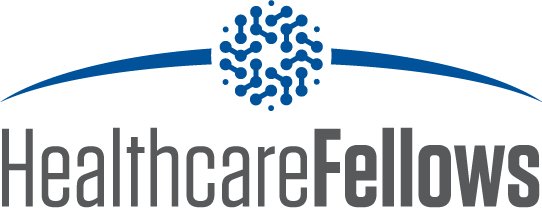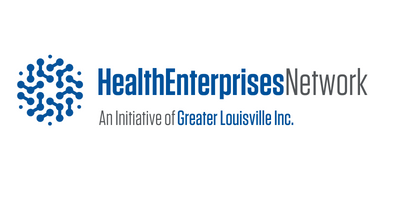 The Healthcare Fellows class of 2021 met virtually in April with a panel discussion covering healthcare innovation. Presenters included Ben Reno-Weber, Deputy Director for Future Knowledge at University Research and Innovation; Sheri Rose, CEO of the Thrive Center; Alice Shade, CEO and president at 4 A Ventures; and Kwane Watson, Founder and CEO of Kare Mobile.
The Healthcare Fellows class of 2021 met virtually in April with a panel discussion covering healthcare innovation. Presenters included Ben Reno-Weber, Deputy Director for Future Knowledge at University Research and Innovation; Sheri Rose, CEO of the Thrive Center; Alice Shade, CEO and president at 4 A Ventures; and Kwane Watson, Founder and CEO of Kare Mobile.
The Healthcare Fellows is a formal executive education program focused on the many business sectors in Louisville’s vast healthcare ecosystem. Created in 2005 by the Health Enterprises Network, Fellows are challenged to grow in their leadership capacity, increase their health-related knowledge, and expand their professional reach through monthly sessions with community leaders, academics, elected officials, organizational experts, researchers and entrepreneurs.
Tom McMahon, JD/MBA, 2021 Chairman of the Board, welcomed the group. McMahon, the Go-To-Market Leader at Circulo Health, a new Medicaid Managed Care company based in Columbus, Ohio, discussed the importance of having parameters around innovation. McMahon defined innovation as “something that makes a 10 percent improvement measured financially, on a performance basis or over time.” McMahon said, “Innovation is not easy, there will be errors along the way, but you should be mindful of the impact of innovation, as well as the process for evaluation and comparison.”
Ben Reno-Weber knows a bit about strategic planning. He has been involved with three strategic planning efforts in the past few years, including Greater Louisville Inc. (GLI), the University of Louisville and the Brookings Institution. Weber said, “The three organizations came to similar conclusions–radical change is necessary.” These organizations quickly realized they would be left behind by peers making smarter investments. All three organizations identified the healthcare space, specifically aging care, as the greatest opportunity.
Weber encouraged the Healthcare Fellows to “embrace the possibility of change, even if that change is scary. Be okay with failing if it gets us to a place where we can succeed.” He recognized the value of personal networks and programs such as the Healthcare Fellows, “We need to leverage the density of our connections, really supporting one another.” Weber continued, “Inside your organization, you don’t have to be the most innovative person, but if you can support the innovations that are already happening, that is good.”
Weber said that the bad news is no one, such as Amazon or IBM, is coming to save us, “We have proven our ability to grow our own. That comes from you all. If we don’t innovate, there will be a long, slow decline. The digital equivalent of the rust belt is in our future.”
Sherry Rose, CEO of Thrive Center, discussed the why of innovation. Rose said we must consider the why of innovation, and focus on the costs of healthcare, for example, falls. Rose said, “We focus on falls because it leads to a rapid decline of our aging adults. We spend 50 million dollars per year around falls. There are three million falls in the U.S with about 840,000 hospitalized each year.” Many go unreported because seniors fear a loss of independence.
Thrive Center was established to spotlight innovation and promote healthy aging by connecting healthcare innovators with the aging care population. Thrive Alliance is comprised of a collaborative group of innovators, researchers and healthcare providers from across the United States who are focused on solving challenges and scaling solutions for the aging care market. Thrive Center brings together in one place an interactive, hands-on experience of the technology, innovation and educational programs facilitated and supported by the Alliance.
Alice Shade is the founder, CEO and president of 4 A Ventures, a company that supports and advises healthcare and early-stage companies. Shade serves as an Entrepreneur in Residence at the University of Louisville, helping researchers and faculty members commercialize discoveries.
Shade describes her role at UofL as one who helps researchers, who don’t necessarily know about financials, discover who will pay for new innovations and what the financial path looks like. Shade connects researchers with industries or interested partners in Louisville who can commercialize the technology.
Shade said this connection to capital is key because the path to commercialization can be a long one, especially if it needs FDA approval. This capital can come from grants, etc., but you need external funds to continue the progress.
Kwane Watson, DDS, is founder and CEO of Kare Mobile, a mobile dental platform that provides comprehensive, concierge dental services. Kare Mobile enables turnkey, mobile concierge dentistry through its network of dentist and hygienist licensees across the United States.
Watson has been a dentist for over 20 years and started Kare Mobile three years ago to address lack of access to oral healthcare in urban and rural communities.
This lack of access was due to lower reimbursement and a lower number of providers. Watson said, “In 2000 there were ten thriving practices in West Louisville, owned and operated by African American dentists. In 2021, this decreased significantly.” According to Watson, there has been a 90 percent decline in number of dental practices owned and operated by dentists because of the perils of practice ownership such as a large, fixed staff cost, large, fixed lease cost, confined radius of operations and greater risk with time variance.
Other challenges include the rising cost of dental education, declining/flat insurance reimbursements, increasing competition for prime market, increasing expenses and payroll and increasing challenge for traditional model.
Watson wanted to start a new dental practice, and Kare Mobile allowed him to go in at a lower price point. Watson said, “Because of this model, I don’t need a call center, an office manager or a revenue cycle management team. It’s me and one assistant.” Other benefits of comprehensive concierge mobile ownership include an affordable fixed lease cost, expanded radius of operations and reduced risk with time variance.
The next Healthcare Fellows session, scheduled for May 20, will cover healthcare headquarters in our region. A Fellows Journal Club, discussing innovations that will change healthcare was on May 6.

Recent Comments